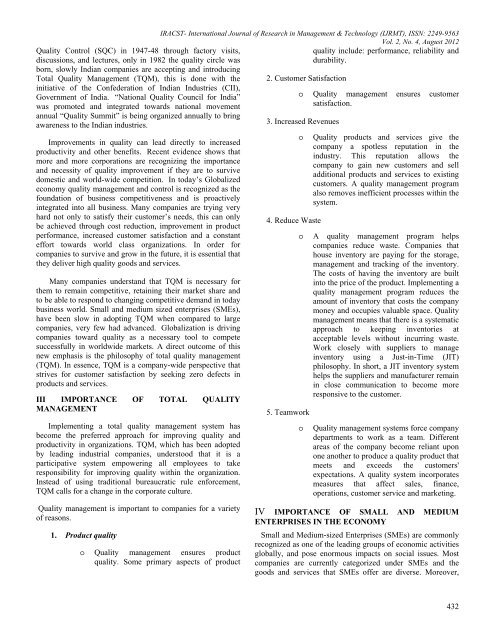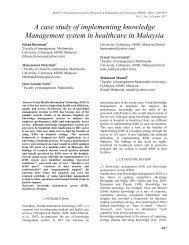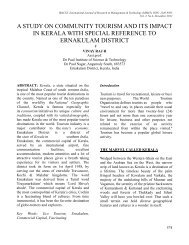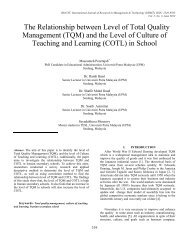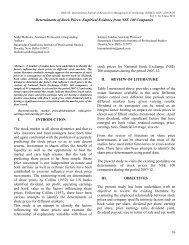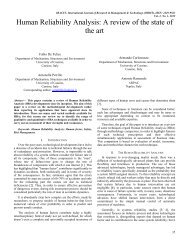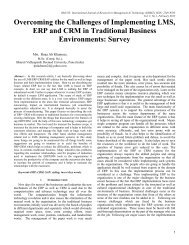ANALYSIS OF TOTAL QUALITY MANAGEMENT – A STUDY WITH ...
ANALYSIS OF TOTAL QUALITY MANAGEMENT – A STUDY WITH ...
ANALYSIS OF TOTAL QUALITY MANAGEMENT – A STUDY WITH ...
You also want an ePaper? Increase the reach of your titles
YUMPU automatically turns print PDFs into web optimized ePapers that Google loves.
Quality Control (SQC) in 1947-48 through factory visits,<br />
discussions, and lectures, only in 1982 the quality circle was<br />
born, slowly Indian companies are accepting and introducing<br />
Total Quality Management (TQM), this is done with the<br />
initiative of the Confederation of Indian Industries (CII),<br />
Government of India. “National Quality Council for India”<br />
was promoted and integrated towards national movement<br />
annual “Quality Summit” is being organized annually to bring<br />
awareness to the Indian industries.<br />
Improvements in quality can lead directly to increased<br />
productivity and other benefits. Recent evidence shows that<br />
more and more corporations are recognizing the importance<br />
and necessity of quality improvement if they are to survive<br />
domestic and world-wide competition. In today’s Globalized<br />
economy quality management and control is recognized as the<br />
foundation of business competitiveness and is proactively<br />
integrated into all business. Many companies are trying very<br />
hard not only to satisfy their customer’s needs, this can only<br />
be achieved through cost reduction, improvement in product<br />
performance, increased customer satisfaction and a constant<br />
effort towards world class organizations. In order for<br />
companies to survive and grow in the future, it is essential that<br />
they deliver high quality goods and services.<br />
Many companies understand that TQM is necessary for<br />
them to remain competitive, retaining their market share and<br />
to be able to respond to changing competitive demand in today<br />
business world. Small and medium sized enterprises (SMEs),<br />
have been slow in adopting TQM when compared to large<br />
companies, very few had advanced. Globalization is driving<br />
companies toward quality as a necessary tool to compete<br />
successfully in worldwide markets. A direct outcome of this<br />
new emphasis is the philosophy of total quality management<br />
(TQM). In essence, TQM is a company-wide perspective that<br />
strives for customer satisfaction by seeking zero defects in<br />
products and services.<br />
III IMPORTANCE <strong>OF</strong> <strong>TOTAL</strong> <strong>QUALITY</strong><br />
<strong>MANAGEMENT</strong><br />
Implementing a total quality management system has<br />
become the preferred approach for improving quality and<br />
productivity in organizations. TQM, which has been adopted<br />
by leading industrial companies, understood that it is a<br />
participative system empowering all employees to take<br />
responsibility for improving quality within the organization.<br />
Instead of using traditional bureaucratic rule enforcement,<br />
TQM calls for a change in the corporate culture.<br />
Quality management is important to companies for a variety<br />
of reasons.<br />
1. Product quality<br />
IRACST- International Journal of Research in Management & Technology (IJRMT), ISSN: 2249-9563<br />
Vol. 2, No. 4, August 2012<br />
quality include: performance, reliability and<br />
durability.<br />
o Quality management ensures product<br />
quality. Some primary aspects of product<br />
2. Customer Satisfaction<br />
o Quality management ensures customer<br />
satisfaction.<br />
3. Increased Revenues<br />
o<br />
4. Reduce Waste<br />
o<br />
5. Teamwork<br />
o<br />
Quality products and services give the<br />
company a spotless reputation in the<br />
industry. This reputation allows the<br />
company to gain new customers and sell<br />
additional products and services to existing<br />
customers. A quality management program<br />
also removes inefficient processes within the<br />
system.<br />
A quality management program helps<br />
companies reduce waste. Companies that<br />
house inventory are paying for the storage,<br />
management and tracking of the inventory.<br />
The costs of having the inventory are built<br />
into the price of the product. Implementing a<br />
quality management program reduces the<br />
amount of inventory that costs the company<br />
money and occupies valuable space. Quality<br />
management means that there is a systematic<br />
approach to keeping inventories at<br />
acceptable levels without incurring waste.<br />
Work closely with suppliers to manage<br />
inventory using a Just-in-Time (JIT)<br />
philosophy. In short, a JIT inventory system<br />
helps the suppliers and manufacturer remain<br />
in close communication to become more<br />
responsive to the customer.<br />
Quality management systems force company<br />
departments to work as a team. Different<br />
areas of the company become reliant upon<br />
one another to produce a quality product that<br />
meets and exceeds the customers'<br />
expectations. A quality system incorporates<br />
measures that affect sales, finance,<br />
operations, customer service and marketing.<br />
IV IMPORTANCE <strong>OF</strong> SMALL AND MEDIUM<br />
ENTERPRISES IN THE ECONOMY<br />
Small and Medium-sized Enterprises (SMEs) are commonly<br />
recognized as one of the leading groups of economic activities<br />
globally, and pose enormous impacts on social issues. Most<br />
companies are currently categorized under SMEs and the<br />
goods and services that SMEs offer are diverse. Moreover,<br />
432


